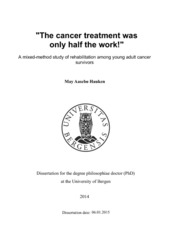| dc.contributor.author | Hauken, May Aasebø | |
| dc.date.accessioned | 2015-02-03T14:19:58Z | |
| dc.date.available | 2015-02-03T14:19:58Z | |
| dc.date.issued | 2015-01-06 | eng |
| dc.identifier.isbn | 978-82-308-2769-7 | eng |
| dc.identifier.uri | https://hdl.handle.net/1956/9332 | |
| dc.description.abstract | Young adults (18-35 years of age) are a small and understudied group of cancer survivors. Increasingly, research demonstrates that this population is at higher risk of physical and psychosocial late-effects and morbidity than younger and older cancer survivors. Nevertheless, their special needs regarding survivorship are poorly understood and there is a particular necessity to gain more knowledge of how to promote participation and health related quality of life (HRQOL) after finishing cancer treatment. Therefore, the overall purpose of this thesis was to provide an increased understanding and knowledge of rehabilitation among young adult cancer survivors (YACS) after completing cancer treatment. Twenty YACS were enrolled in a rehabilitation program structured around three weeks of residential rehabilitation and one-week follow-up visits after three and six months. The program consisted of goal setting, physical activity, psychoeducation, individual follow-ups, peer support and a next of kin weekend. A mixed-method approach was adopted, collecting data simultaneously through questionnaires, physical testing and semi-structured interviews at four points, in addition to questionnaires at a one-year follow-up. Using a qualitative approach, Paper I explored how YACS experienced re-entering everyday life after completing cancer treatment. “Meeting reality” was identified as a bridging theme and described that participants found re-entering everyday life much harder than they had anticipated. This was elaborated by four main themes: 1) lack of preparation for everyday life after cancer treatment, consequently experiencing a mismatch between patients' expectations and the perceived reality; 2) experiencing late-effects, especially fatigue; 3) lack of understanding from within both their own social networks and healthcare providers; 4) being neither sick nor healthy and calling for more knowledge and a more comprehensive followup. Using a mixed-method approach, Paper II studied whether a goal-oriented rehabilitation program influenced participation in everyday life, as well as how participants experienced this process. The quantitative results indicated high goal-achievement and increased participation, measured as significant increases in performance and in satisfaction of performance from the start to the end of the program. The qualitative results indicated that a successful process seems to be dependent on experiences related to coping and control. Finding a balance between different areas of life, gaining new insight and professional follow-up were identified as important factors for enhancing coping and control. Using a quantitative approach, Paper III studied whether participants’ HRQOL and physical capacity improved after attending the rehabilitation program. The results indicated significant increases and large effect sizes within all functional dimensions of HRQOL and in overall HRQOL, as well as a decrease in fatigue at the end of the program. These results were mainly maintained at a one-year follow-up. Objective testing indicated significant changes but small effect sizes in physical fitness, lung capacity and left hand strength. No significant changes were measured in right hand strength or body mass index. The YACS’ overall compliance with the rehabilitation program was high. The results suggested major shortcomings in preparing YACS for everyday life after cancer treatment, as well as in multidisciplinary follow-up after finishing treatment. A complex rehabilitation program tailored for YACS in need appears to be helpful for initiating the rehabilitation process and for promoting participation and HRQOL. Important elements of such a rehabilitation program appears to be the setting of individual goals, individually tailored physical activity, psychoeducation based on cognitive therapy, individual follow-up and peer support. The results of this research, however, illuminates that rehabilitation is not a straightforward process, but one that requires time and professional follow-up. The knowledge gained from this study illustrates the importance of screening YACS during their treatment for HRQOL (including fatigue), and to prepare them for survivorship. The results also highlight the importance of focusing on participation in all areas of life and not only patients' professional lives. These results may be useful as a basis for the development of survivorship-care programs for YACS. Even if the results from this study cannot be generalized to YACS as a whole, the achieved results nonetheless provide important indications for crucial elements and factors within the relatively new research field of YACS rehabilitation. | en_US |
| dc.language.iso | eng | eng |
| dc.publisher | The University of Bergen | eng |
| dc.relation.haspart | Paper I: Hauken, M. Aa., Larsen, T. M. B, Holsen, I. (2013). Meeting Reality: Young Adult Cancer Survivors' Experiences of Re-entering Everyday Life after Cancer Treatment. Cancer Nursing 36(5), 17-26. The article is not available in BORA due to publisher restrictions. The published version is available at: <a href="http://dx.doi.org/10.1097/ncc.0b013e318278d4fc" target="blank">http://dx.doi.org/10.1097/ncc.0b013e318278d4fc</a> | eng |
| dc.relation.haspart | Paper II: Hauken, M. Aa., Holsen, I., Fismen, E., Larsen, T. M. B. (2014): Participating in Life Again: A Mixed-Method Study on a Goal-Orientated Rehabilitation Program for Young Adult Cancer Survivors. Cancer Nursing 37(4), 48-59. The article is not available in BORA due to publisher restrictions. The published version is available at: <a href="http://dx.doi.org/10.1097/ncc.0b013e31829a9add" target="blank">http://dx.doi.org/10.1097/ncc.0b013e31829a9add</a> | eng |
| dc.relation.haspart | Paper III: Hauken, M. Aa., Holsen, I., Fismen, E., Larsen, T.M.B. (2015): Working towards a Good Life as a Cancer Survivor: A Longitudinal Study on Positive Health Outcomes of a Rehabilitation Program for Young Adult Cancer Survivors. Cancer Nursing 38(1), 3-15. The article is available at: <a href="http://hdl.handle.net/1956/8969" target="blank">http://hdl.handle.net/1956/8969</a> | eng |
| dc.title | "The cancer treatment was only half the work!". A mixed-method study of rehabilitation among young adult cancer survivors | eng |
| dc.type | Doctoral thesis | |
| dc.rights.holder | Copyright the author. All rights reserved | |
| dc.identifier.cristin | 1182580 | |

